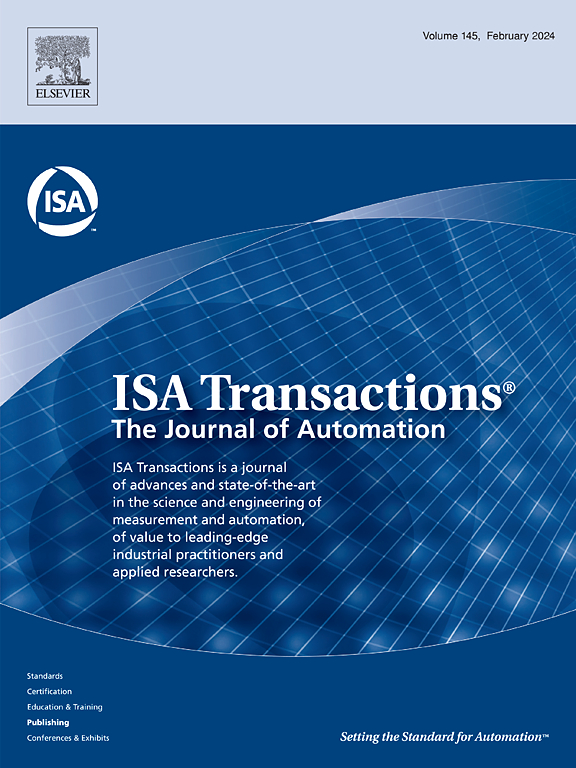Dual-loop optimization of digital accelerometers based on advanced dual-degree-of-freedom Smith predictor
IF 6.5
2区 计算机科学
Q1 AUTOMATION & CONTROL SYSTEMS
引用次数: 0
Abstract
In digital accelerometers, the setpoint loop is designed to balance the controlled object, and the disturbance loop is used to measure external inputs. Traditional closed-loop control structure of digital accelerometers is optimized only for the disturbance loop, failing to optimize the performance of the dual loops simultaneously. An advanced dual-degree-of-freedom (ADOF) Smith predictive control is proposed herein, structurally isolating the setpoint loop from the disturbance loop. Firstly, the principle of the closed-loop digital accelerometer is elaborated, and the contradiction between the performance optimization of dual loops is analyzed. Secondly, an ADOF Smith predictive control is proposed and compared with other control structures. Furthermore, the setpoint and disturbance controllers in the structure are designed using the Dahlin algorithm and H optimal control methods for parameter tuning, with the controllers being determined by a single parameter. To quantitatively describe the relationship between the control parameters and robust performance, the relationship between the control parameters and the margin indicators is derived, and the control performance is evaluated. Finally, an experimental platform of a digital closed-loop accelerometer is constructed to validate the proposed ADOF control structure and parameter tuning methods. The experimental results show that the performance of the proposed ADOF control structure significantly outperforms traditional digital closed-loop control and filtered Smith predictive control, and compared with the dual-degree-of-freedom control structure, it exhibits better nominal performance under low robustness parameters due to delay compensation.
基于先进双自由度Smith预测器的数字加速度计双环优化。
在数字加速度计中,设定点回路用于平衡被控对象,干扰回路用于测量外部输入。传统的数字加速度计闭环控制结构仅针对扰动环进行优化,无法同时优化双环的性能。提出了一种先进的双自由度Smith预测控制方法,从结构上隔离了设定值环和扰动环。首先阐述了闭环数字加速度计的工作原理,分析了双环性能优化之间的矛盾。其次,提出了一种ADOF Smith预测控制,并与其他控制结构进行了比较。此外,采用Dahlin算法和H∞最优控制方法进行参数整定,并采用单参数确定控制器,设计了结构中的设定值控制器和扰动控制器。为了定量描述控制参数与鲁棒性能之间的关系,推导了控制参数与裕度指标之间的关系,并对控制性能进行了评价。最后,搭建了数字闭环加速度计实验平台,对所提出的ADOF控制结构和参数整定方法进行了验证。实验结果表明,所提出的ADOF控制结构的性能明显优于传统的数字闭环控制和滤波Smith预测控制,并且与双自由度控制结构相比,由于延迟补偿,在低鲁棒性参数下具有更好的标称性能。
本文章由计算机程序翻译,如有差异,请以英文原文为准。
求助全文
约1分钟内获得全文
求助全文
来源期刊

ISA transactions
工程技术-工程:综合
CiteScore
11.70
自引率
12.30%
发文量
824
审稿时长
4.4 months
期刊介绍:
ISA Transactions serves as a platform for showcasing advancements in measurement and automation, catering to both industrial practitioners and applied researchers. It covers a wide array of topics within measurement, including sensors, signal processing, data analysis, and fault detection, supported by techniques such as artificial intelligence and communication systems. Automation topics encompass control strategies, modelling, system reliability, and maintenance, alongside optimization and human-machine interaction. The journal targets research and development professionals in control systems, process instrumentation, and automation from academia and industry.
 求助内容:
求助内容: 应助结果提醒方式:
应助结果提醒方式:


